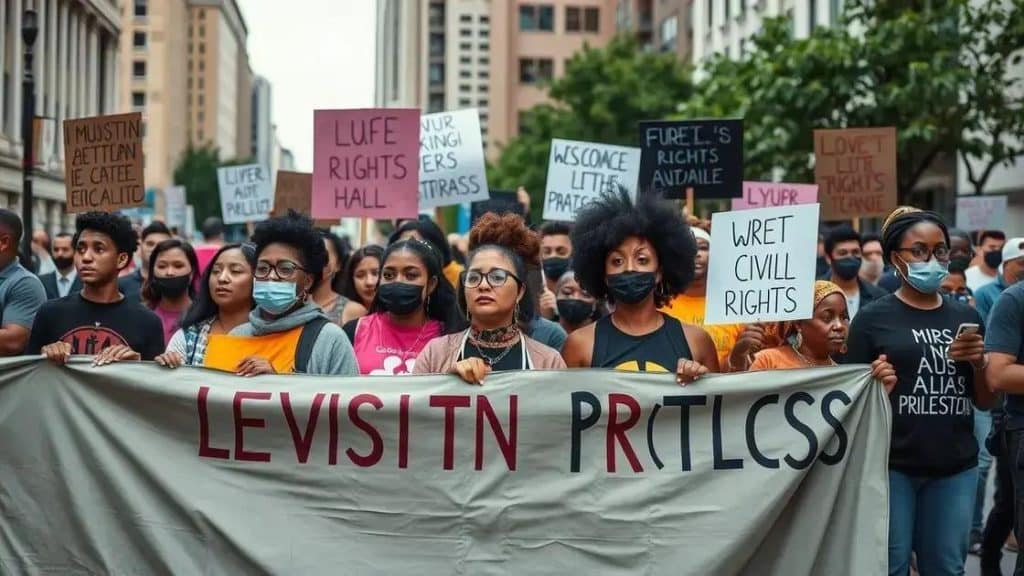Third civil rights updates: staying informed and engaged

Getting involved in the civil rights movement involves educating yourself, joining local organizations, advocating for change, and staying engaged with ongoing issues to promote equality and justice in your community.
Third civil rights updates are essential for anyone wanting to stay informed about ongoing social issues. Have you noticed how these updates affect us all? In this article, we’ll delve into recent developments and what they mean for our society.
Understanding the third civil rights updates
Understanding the third civil rights updates is vital for people who care about equality and justice. These updates reflect ongoing changes in laws and social movements that impact our society today. They provide insights into how our rights are evolving and what challenges still exist.
What Are the Recent Updates?
Recent civil rights updates focus on areas such as voting rights, employment discrimination, and police reform. Communities across the nation are advocating for these changes, pushing for fair treatment and opportunities for everyone.
- New voting laws to protect access to the polls.
- Policies aimed at reducing workplace discrimination.
- Measures to hold law enforcement accountable.
Each of these updates highlights the progress we have made and the hurdles we still face. It’s important to remain informed about these developments, as they can greatly affect our daily lives.
Why They Matter
The third civil rights updates are not just legal changes; they represent the voices of many who wish to see a fair and just society. Activists and everyday citizens work together to advocate for these issues, showing the power of community engagement.
Remaining aware of these updates allows individuals to stay engaged in advocacy efforts. Learning about the issues empowers us to take informed actions, whether by attending protests, contacting representatives, or supporting organizations that specialize in civil rights.
Furthermore, the dialogue surrounding these updates fosters awareness among friends and family. Discussing these topics helps circulate important information and encourages others to become involved as well.
Participating in this conversation is crucial because understanding the implications of these updates can lead to greater societal change. When we comprehend our rights, we are better equipped to advocate for ourselves and others.
Recent legislative changes and their impact
Recent legislative changes play a crucial role in shaping the landscape of civil rights. These changes can affect many areas, including voting rights, housing, and workplace equality. Keeping up with these updates ensures that individuals know their rights and can advocate for fairness.
Notable Legislative Changes
Recent laws have been introduced to address issues such as discrimination and accessibility. Here are a few notable changes:
- Laws aimed at preventing voter suppression.
- Policies to enhance workplace safety and diversify hiring practices.
- Measures that require better access to public services for disabled individuals.
Each of these laws aims to create a more equitable society. For instance, laws against voter suppression are designed to ensure everyone has the opportunity to participate in elections. These measures reflect a commitment to protecting fundamental rights.
The Impact of these Changes
The impact of these legislative changes can be seen across various communities. For many, these laws bring hope and a sense of empowerment. The protection of voting rights offers individuals the chance to influence their government, while workplace equality laws help promote a diverse workforce.
However, challenges remain. Despite new laws, enforcement can be inconsistent. Many groups continue to advocate for stronger protections. Understanding these changes allows individuals to recognize their rights and the resources available to them.
Ultimately, staying informed about recent legislative changes can spark conversations and drive action within communities. When people discuss these topics, they spread awareness and encourage others to engage in advocacy for civil rights.
Key figures in the third civil rights movement

Key figures in the third civil rights movement have significantly influenced the fight for equality and justice. Their dedication and efforts have brought crucial issues to the forefront of public consciousness. Understanding their contributions helps highlight the ongoing struggle for civil rights in society.
Notable Leaders
Many leaders emerged in the third civil rights movement, each bringing unique perspectives and strategies. Some of the most impactful figures include:
- Stacey Abrams – known for her work on voting rights.
- Ben Jealous – former NAACP president advocating for social justice.
- Michelle Alexander – author of “The New Jim Crow,” discussing systemic racism.
Each of these leaders has played a role in shaping policies and raising awareness about civil rights challenges. Their voices echo the frustrations and hopes of many Americans seeking change.
The Impact of Their Work
The impact of these key figures extends beyond their immediate actions. They mobilize communities and inspire the next generation of activists. For instance, Stacey Abrams’s advocacy has led to increased voter registration and turnout, empowering marginalized voices.
Moreover, Michelle Alexander’s work sparked national conversations about mass incarceration and systemic racism. Her insights urge society to reevaluate current policies and consider their broader implications.
Supporting these leaders means contributing to a larger movement focused on equality and justice. Engaging with their work encourages informed discussions and actions, fostering a sense of unity and purpose among supporters.
Challenges faced in today’s civil rights activism
Challenges faced in today’s civil rights activism can hinder progress and impact communities. Despite advances, activists encounter various obstacles that complicate their efforts to promote equality and justice. Understanding these challenges helps shed light on the ongoing fight for civil rights.
Systemic Barriers
One significant challenge is the presence of systemic barriers that persist in society. These barriers often include:
- Voter suppression tactics that limit access to the polls.
- Institutional racism that influences policies and practices.
- Lack of funding and support for grassroots organizations.
Such barriers make it harder for communities to advocate for their rights. Activists must navigate these complex issues while striving for legislative changes that benefit all.
Public Perception
Another challenge is public perception of civil rights movements. Misunderstandings and misinformation can lead to negative attitudes toward activism. For example, some people may view protests as disruptive rather than necessary expressions of dissent.
The media also plays a crucial role in shaping perceptions. Positive coverage can energize movements, while negative portrayals can undermine efforts. Activists must work to counteract this narrative by sharing their stories and goals.
Additionally, the rise of social media has created a double-edged sword. While it allows for greater outreach and organization, it also fosters division and misinformation. Navigating this landscape is a continual struggle for those involved in civil rights activism.
By understanding these challenges, individuals can better support civil rights movements. Engaging in informed discussions and sharing resources can help amplify the voices of those fighting for equality and justice in our society.
How to get involved in the movement
Getting involved in the civil rights movement is both important and empowering. Individuals can play a vital role in advocating for equality and justice in their communities. Here are some actionable steps to consider when looking to make a difference.
Educate Yourself
The first step in getting involved is to educate yourself about civil rights issues. Understanding the history and current challenges can provide a strong foundation. There are several resources available:
- Books and documentaries on civil rights history.
- Online courses focused on social justice topics.
- Local workshops and seminars that cover current issues.
An informed activist can better engage in meaningful conversations and take appropriate actions.
Join Local Organizations
Connecting with local organizations dedicated to civil rights can amplify your impact. These groups often welcome new members and provide volunteer opportunities. Joining allows you to collaborate with like-minded individuals who are passionate about change.
Consider participating in:
- Community meetings to discuss local civil rights issues.
- Volunteering for events that promote awareness and activism.
- Fundraising efforts for civil rights campaigns.
Being active in these organizations will also help you build a network of support.
Advocate for Change
Advocating for change can take various forms. Writing to your local representatives, promoting awareness through social media, and participating in peaceful protests are all powerful ways to make your voice heard. Every action contributes to the ongoing fight for justice.
Sharing information about relevant legislation and encouraging others to participate can also create a ripple effect. By mobilizing others, you increase the reach of your advocacy efforts.
Ultimately, getting involved in the movement is about making a commitment to support civil rights and constantly seeking ways to contribute positively. Every small action can help foster a more equitable society.
The journey toward civil rights is ongoing, and every individual can play a part in this essential movement. By educating yourself, joining organizations, advocating for change, and remaining engaged, you contribute to a more equal society. Remember, each small action can create a significant impact. Together, we can push for progress and continue the fight for justice.
FAQ – Frequently Asked Questions About Getting Involved in the Civil Rights Movement
How can I start educating myself about civil rights issues?
You can read books, watch documentaries, or take online courses focused on civil rights history and current topics.
What are some reliable organizations I can join?
Look for local civil rights groups, nonprofits, or advocacy organizations that align with your interests.
How can I effectively advocate for change?
You can write to your representatives, participate in peaceful protests, and raise awareness through social media.
What are the benefits of getting involved in civil rights activism?
Getting involved helps create positive change in society and allows you to connect with like-minded individuals who share your passion for justice.





